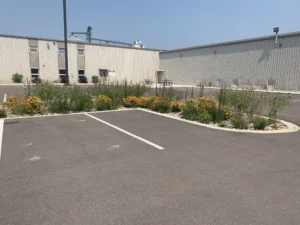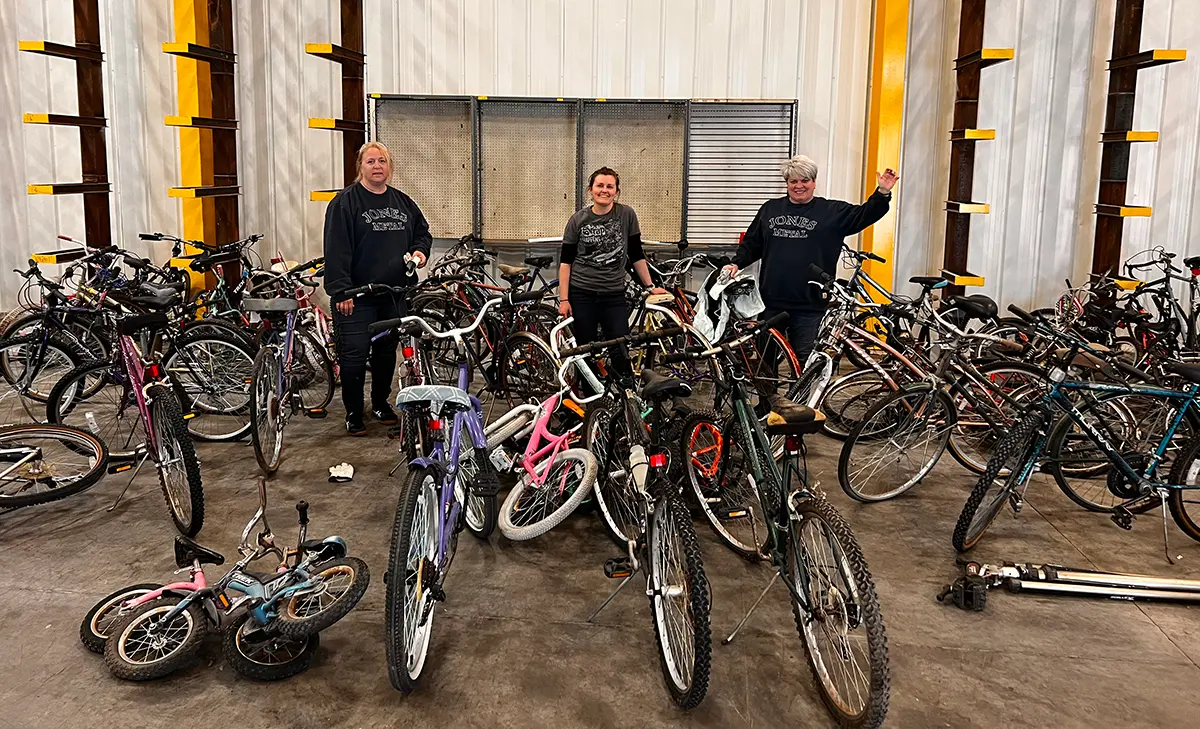After 82 years and three generations in business, a lot has been learned and changed on the way to more sustainable practices. Jones Metal strives for continuous improvement, always looking for more ways (and new technology) to make a difference in their environmental impact and help reduce their carbon footprint.
Second Generation Owner, Marcia Richards, Leads by Example
 Marcia recycles everything she can and by the book; in other words, if it is supposed to be washed and labels removed, it is done. Marcia also composts her food waste, taking it to the local collection facility and has her own compost bin.
Marcia recycles everything she can and by the book; in other words, if it is supposed to be washed and labels removed, it is done. Marcia also composts her food waste, taking it to the local collection facility and has her own compost bin.
As a Master Gardener, DNR Volunteer, and octogenarian, Marcia has seen the effects of climate change in her garden, on the prairie, at the lake, and in the woods. It isn’t something she preaches or puts on others, but she is concerned and wants to do her part.
The example set by Marcia isn’t lost on her children and current Jones Metal Inc. owners, David and Sarah Richards, and Jessica Richards-Palmquist.
President and CEO Sarah Richards comments “we all have different political beliefs, but we don’t see this as a political issue. We see it as a practical issue, purely a choice to make. Make a mess by throwing your trash out the window, filling the ocean with plastic, poisoning the most valuable resource, water; or don’t. Choose to do right by our children and their children, or don’t. At Jones, we choose to try and make a difference and to leave a better planet for our kids. It’s a simple choice we made.”
10 Sustainable Practices in Metal Fabrication
Over the years, Jones Metal has created and refined many eco-friendly processes and invested in new technology to recycle materials, optimize fabrication process, and minimize waste at their Mankato, MN based facility.
These are the 10 sustainable practices always on their radar:
1. Material Recycling: recycles, reuses or properly dispose of everything from scrap metal to paper to spent fuel and toxic chemicals, and shipping materials to reduce landfill waste and conserve resources.
2. Energy Efficient Practices: participates in local energy company’s energy-controlled rate program, voluntarily rolling off the grid during peak demand times (especially during summer months) utilizing generator to save power.
3. Energy Efficient Facility: capital funding was used to update the plant with efficient lighting, new windows, doors, and entryways to reduce air leaks and the building was rewired. Air conditioning system was also updated to eliminate freon, and new more-efficient transformers were installed.
4. Efficient Equipment: regularly maintains all equipment and evaluates energy efficiency when replacing production equipment.
5. Optimizing Product Design: in-house Engineering team strives to improve designs for manufacturing to be more efficient. They design with less welding, nest all laser products to maximize sheet metal utilization, and cut the skeleton leftovers into smaller more economical pieces.
6. Efficient Process: utilizes an Environmental Management System and has been Paper-Free since 2018 using digital documentation and communication methods with customers, suppliers, and employees. The team is currently exploring ISO 14001 certification.
7. Reduce Waste and Toxic emissions: reduces waste across the plant and uses lowest toxicity chemicals for practical and effective sheet metal production to reduce exposure and potential water contamination. Regularly maintains equipment and Spill Team, Supervisors, Operations Leader and David Richards attend Hazardous Waste Operations and Emergency Response (Hazwoper) training and are fully aware of their critical role in case there is a spill.
8. Sustainable Sourcing: when specifications allow, recycled sheet metal products are used for projects and Jones always uses material manufactured or recycled in the USA. All materials used by the Jones Metal team are produced to the highest standards in the world.
9. Stay Current on Regulations: following Defense Federal Regulation Supplement (DFARS) and Registration, Evaluation, Authorization, and Restriction of Chemicals (REACH) has helped the Jones team understand material composition and chemicals as well as importance of certificate of origin.
10. Employee Education: all employees receive AWAIR training where eco-procedures, chemical information, and handling procedures are reviewed. Jones encourages employees to bring in their own electronics and batteries, used oil and filters, scrap metal, and household cardboard for recycling and provide containers for proper storage of all of it.
Eco-Friendly Initiatives Outside the Manufacturing Facility
 In addition to the established processes in the office and on the shop floor, the team is always looking for other opportunities to be eco-friendly. In 2020, a rain garden was installed in the Jones Metal parking lot to reduce run off into the city sewer system, planted with native plants that also entice and feed pollinators. The Monarch, Swallow Tail, and Painted Lady butterflies love the gardens and put on a beautiful show all summer. Other areas of the 17-acre campus are mowed infrequently to help filter runoff and attract other species.
In addition to the established processes in the office and on the shop floor, the team is always looking for other opportunities to be eco-friendly. In 2020, a rain garden was installed in the Jones Metal parking lot to reduce run off into the city sewer system, planted with native plants that also entice and feed pollinators. The Monarch, Swallow Tail, and Painted Lady butterflies love the gardens and put on a beautiful show all summer. Other areas of the 17-acre campus are mowed infrequently to help filter runoff and attract other species.
When evaluating Jones Metal’s transportation approach, the decision was made to roll the shipping vehicles over into a leased fleet to use the most efficient, state-of-the-art trucks to be as efficient with fuel as possible. The trucks are also equipped with GPS units that help reduce milage by eliminating some backtracking. When Shipping Supervisor Emily Rand needs to have the trucks make an extra stop, she looks to see where they are and if we can eliminate backtracking or if it gets picked up the next day.
The long-term goal is to be the most automated custom metal fabrication company of their size in the United States and that requires continual efficiency gains. This kind of automation maximizes the skills of every team member from estimating, order processing, engineering, and design, to production, quality assurance, and shipping.
Inspiring Metal Recycling in the Local Community
For Earth Day 2024, the whole Jones Metal team got into the recycling spirit and hosted ‘Scrap4Kids Metal and Bike Recycling Drive’ at their facility in Mankato.
The local community came out in force and filled two dumpsters with 7,280 pounds of household scrap metal to be recycled and donated 80+ bikes. The proceeds from the metal recycling were matched by event co-sponsor, Alter Trading, for a total donation of $874 which went to Key City Bike, a Mankato based non-profit focused on keeping bikes out of the landfill.
The Scrap4Kids event was concepted by President and CEO Sarah Richards “We take recycling and eco practices seriously every day in our facility and want to encourage metal recycling in our community. Scrap4Kids has been a concept in my head for a long time and we decided Earth Day was a perfect time to launch.”
“We chose Key City Bike as the beneficiary for the inaugural event because helping people enjoy the outdoors is very important to us and we like the idea of scrap metal and bikes being recycled and reused. Reduce, reuse, recycle, and ride!”
Jones Metal is committed to continuous improvement; always looking for ways to be more efficient, effective, and kind to the future and go above and beyond what city, state and federal environmental regulations require. It’s who we are. We’re dedicated to leaving our future generations a better planet.
For more information on the eco-friendly practices mentioned in this article:
- Environmental Management Systems https://www.epa.gov/ems
- Department of National Resources, Minnesota (DNR) https://www.dnr.state.mn.us/
- Hazardous Waste Operations and Emergency Response (Hazwoper) Practices: https://www.osha.gov/emergency-preparedness/hazardous-waste-operations/faq
- Rain Gardens https://www.epa.gov/soakuptherain/soak-rain-rain-gardens
- Key City Bike, Mankato https://www.keycitybike.org/

